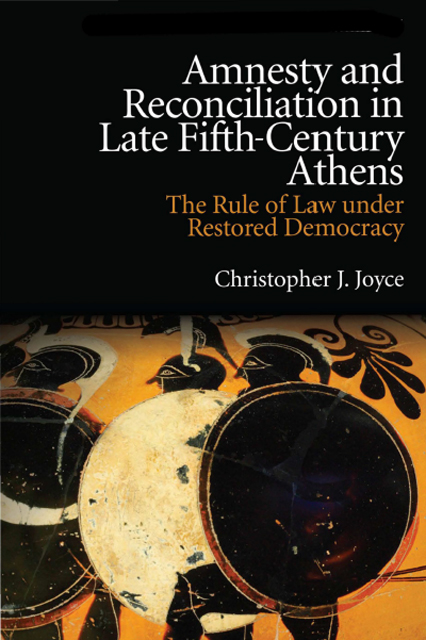Book contents
- Frontmatter
- Contents
- Preface and Acknowledgements
- List of Abbreviations
- 1 Introduction: The Athenian Reconciliation in Modern Scholarship
- 2 Civil Strife at Athens, 404–403
- 3 Oaths and Covenants
- 4 The Legal Scrutiny and the Resurrection of the Rule of Law
- 5 The Amnesty Applied (I): The Trials of Agoratus and Eratosthenes
- 6 The Amnesty Applied (II): The Trials of Callimachus and Socrates
- 7 The Athenian Reconciliation as the Paradigm for the Greek World in the Classical and Hellenistic Ages
- 8 The Rule of Law Restored: The Legacy of the Reconciliation in the Fourth Century
- Bibliography
- Index Locorum
- Subject Index
2 - Civil Strife at Athens, 404–403
Published online by Cambridge University Press: 03 June 2023
- Frontmatter
- Contents
- Preface and Acknowledgements
- List of Abbreviations
- 1 Introduction: The Athenian Reconciliation in Modern Scholarship
- 2 Civil Strife at Athens, 404–403
- 3 Oaths and Covenants
- 4 The Legal Scrutiny and the Resurrection of the Rule of Law
- 5 The Amnesty Applied (I): The Trials of Agoratus and Eratosthenes
- 6 The Amnesty Applied (II): The Trials of Callimachus and Socrates
- 7 The Athenian Reconciliation as the Paradigm for the Greek World in the Classical and Hellenistic Ages
- 8 The Rule of Law Restored: The Legacy of the Reconciliation in the Fourth Century
- Bibliography
- Index Locorum
- Subject Index
Summary
The Athenian Amnesty Agreement of 403 bce is the best-known treaty of its kind from Greek antiquity and was hailed in later ages as the paradigm of reconciliation. A full understanding of the difficulties and challenges faced by Athens in 403, when the Thirty were defeated and overthrown, in reinstalling the ancient and prized democracy is impossible without exploration of the period which preceded it. It would be tempting to begin with the democrat Thrasybulus in Piraeus over the oligarchs and the Reconciliation that followed. As Cloché realised, however, the magnitude and scale of what the democrats achieved after regaining control of the city in the summer of 403 is to be measured against the scale and size of the calamity which gripped Athens during the eight intervening months between her defeat at the hands of the Spartan general Lysander in autumn 404 and the resurgence of the democratic resistance the following year. Crucially, the regime of the Thirty Tyrants, or simply ‘the Thirty’, signalled a suspension of law and order alongside systematic suppression of the principle of legal justice. To rebuild democracy in the wake of these calamities, it was essential for the victorious democrats in 403 to re-establish justice and the rule of law. The restored democracy of the fourth century is viewed by some as a democracy ‘tempered’ by legal restraint, in contrast to fifth-century Athens, often caricatured as ‘lawless’ democracy, but a closer look at the evidence will show that democracy and rule of law were two sides of the same coin, and that in order to re-establish democratic principle, it was of paramount importance to reaffirm the sovereignty of law as the final authority through and under which democracy and justice could be guaranteed.
Some critics may object to a chapter on the Thirty, on the grounds that it presents merely a sideshow. I wish to argue otherwise. The thirty-ninth chapter of the Aristotelian Ath. Pol. gives a nearly complete and compendious summary of the Reconciliation terms, which the Athenians contracted on the twelfth day of the Attic month Boedromion, in the archonship of Eucleides (403/2). These contracts or covenants are of vital historical importance, and modern scholars have rightly prioritised them in their reconstruction of the Athenian Amnesty Agreement. Yet, at the same time, they tell only part of the story.
- Type
- Chapter
- Information
- Amnesty and Reconciliation in Late Fifth-Century AthensThe Rule of Law under Restored Democracy, pp. 38 - 67Publisher: Edinburgh University PressPrint publication year: 2022



